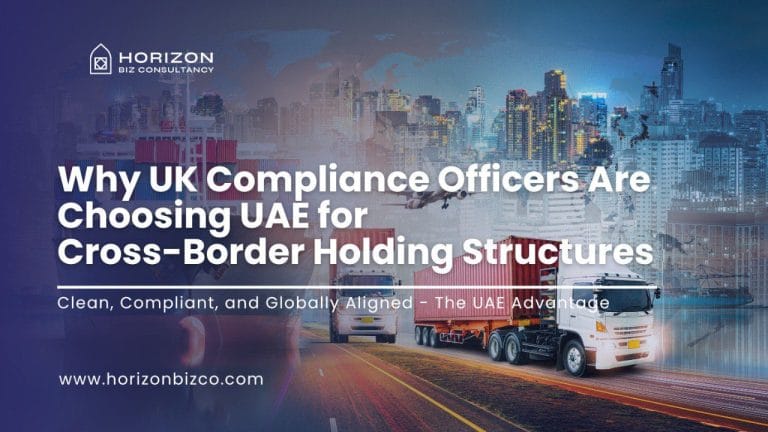The UAE is no longer just a tax-friendly business destination, it’s fast becoming a compliance-aligned global hub for cross-border holding and intellectual property (IP) structures. With its robust legal frameworks, alignment with international financial regulations, and world-class free zones like ADGM and DIFC, the UAE is now a preferred destination for UK-based compliance officers and CFOs seeking to scale internationally, without raising red flags.
Why the UAE Now Makes Sense for UK Compliance Teams
1. ADGM & DIFC: Common Law Frameworks with Global Trust
Both ADGM and DIFC operate under an English common law legal system, giving UK firms confidence in predictability, enforceability, and legal familiarity. For compliance professionals, this reduces legal ambiguity in cross-border structuring.
2. Strong Global Compliance Alignment
The UAE has made significant upgrades in AML/CFT standards, exiting the FATF grey list in 2024. This positions the country as a trustworthy jurisdiction in the eyes of global regulators and banks.
3. Substance and Transparency Without Complexity
Holding and SPV structures in the UAE (especially in ADGM, DIFC, and RAKEZ) offer:
- Clear economic substance rules
- Fast-track licensing for SPVs and Holding Companies
- Zero physical office requirement in some cases
- Efficient governance models with minimal overhead
This strikes a balance between regulatory compliance and cost-effective structuring.
How UK Companies Are Using UAE SPVs Effectively
1. Holding IP and Royalty Routing
UK firms are using UAE holding structures to manage intellectual property (IP) and route royalties through tax-efficient setups, especially when servicing Asia or Africa.
2. Dividend Distribution and Wealth Repatriation
Clean banking and 100% repatriation of capital and profits make the UAE a reliable jurisdiction for routing dividends from multiple countries into a centralised, compliant vehicle.
3. Managing Multi-Jurisdictional Subsidiaries
UK-headquartered companies can use UAE SPVs to hold subsidiaries in other GCC, African, or Asian countries, giving them greater control and simplified reporting.
What Compliance Officers Should Watch For
- Choose the right free zone: ADGM and DIFC offer more robust frameworks for governance and reporting.
- Understand Economic Substance Rules (ESR): UAE is strict on substance, make sure your structure reflects real activity or oversight.
- Document everything: Transparency is key when repatriating income or moving IP. Have proper inter-company agreements in place.
Conclusion
For UK compliance officers and strategic decision-makers, the UAE presents a rare blend of:
- Regulatory credibility
- Common law familiarity
- Zero tax on capital gains and foreign income
- Ease of banking and operations
Whether you’re restructuring global assets or looking for a scalable, compliant jurisdiction to base your holding or IP entity, the UAE is worth serious consideration in 2025.
Need help building a clean, compliant holding structure in the UAE?
Let’s connect and explore the right free zone and legal structure for your business.
FAQ’s
UK companies are increasingly using UAE holding structures to optimize tax efficiency, access 100% foreign ownership, and benefit from robust compliance frameworks in ADGM and DIFC. These jurisdictions align with Common Law, making them attractive for legal clarity and cross-border transactions.
Yes, the UAE has significantly upgraded its compliance landscape and is now aligned with FATF recommendations and international AML protocols. This makes it a credible choice for UK compliance officers who seek risk-averse jurisdictions for structuring overseas investments.
Absolutely. UAE’s extensive Double Taxation Agreements (DTA), especially with the UK, allow efficient routing of dividends, royalties, and capital gains with minimal withholding taxes, when structured correctly via an SPV or holding company.
ADGM and DIFC follow English Common Law and enforce independent regulatory oversight through FSRA and DFSA respectively. Their transparent KYC/AML procedures ensure UK entities meet global standards while maintaining business flexibility.
For holding and SPV structures, especially in ADGM and DIFC, no physical office is required. This reduces operational overheads and makes it easier for UK companies to manage cross-border holdings without relocating staff or infrastructure.





